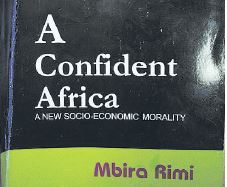×
The Standard e-Paper
Stay Informed, Even Offline

At a time when all the talk is about a continent on the rise, one man has written a brave book, A Confident Africa, A New Social- Economic Morality. Brave, because author Mbira Rimi delves into issues that define humanity, from the economy to family to sexuality in a no-holds-barred manner, telling how Africa lost her values, thanks to the West, resulting in the myriad problems she faces.